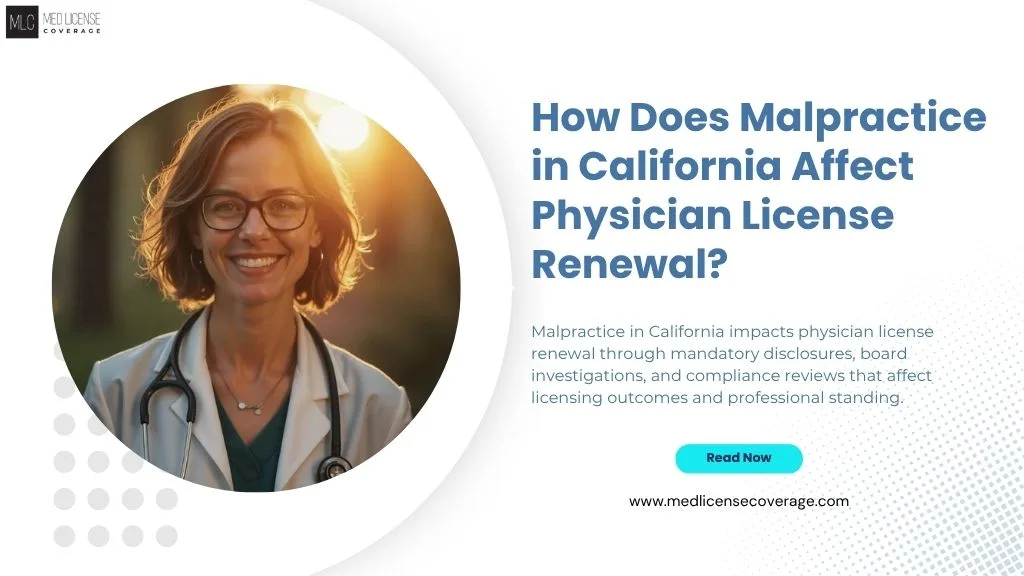Malpractice in California plays a key role in physician license renewal. Boards inspect every malpractice claim closely. Renewal outcomes depend on disclosure, context, and corrective action. Each case can delay or block renewal entirely.
California’s Regulatory Landscape for Malpractice
The Medical Board of California governs physician licensing. All malpractice in California is subject to state rules. Complaints, settlements, and judgements come under review. State laws demand physician honesty and public safety. Malpractice by State rules also apply, so comparisons across states influence board decisions.
Disclosure Requirements at Renewal
To pursue physician license renewal, all malpractice incidents must be disclosed. Application forms ask for full case history. Omissions lead to rejection or investigation.The board cross-checks with countrywide databases and insurer information. Complete disclosure establishes belief and legitimacy.
Investigations Triggered with the Aid of Malpractice Claims
Malpractice in California often triggers investigations. Case files, expert testimonies, and patient records get reviewed. The board looks for negligence patterns or ethical errors. Investigations may pause the renewal process until resolution.
Treatment of Settlements and Judgments
Settlements and judgments remain relevant during renewal. Even without admission of fault, a settlement is assessed. High amounts draw attention. Boards evaluate context, causation, and risk. Case patterns factor into renewal approvals or denials.
License Suspension and Conditional Renewal
When malpractice findings are serious, license suspension may occur. In less severe cases, conditional renewals may be granted. Conditions can include supervised practice, restrictions, or remedial training. Such measures maintain patient safety while allowing practitioners to continue work.

Educational and Corrective Requirements
Malpractice in California often demands corrective education. Participants may complete continuing medical education in ethics, risk reduction, or patient communication. Successful completion is often required for license renewal. Education shows intent to improve and prevents future misconduct.
Public Access to Disciplinary Records
Malpractice in California appears in public disciplinary records. Patients, employers, and hospitals access board records. Transparency increases accountability. A clean public record eases future renewal and career progress.
Multi-State Licensing and Renewal Integrity
Malpractice in California affects licensing in other states. Renewal forms elsewhere require disclosure of all prior malpractice. Boards in other states compare histories across states. Inconsistent disclosures lead to suspicion or denials. Malpractice by State frameworks reinforce that effect.
Role of Physician Licensing Services
Physician licensing services aid with complex renewal cases. These services organize documentation, ensure proper case summaries, and manage submission timing. In malpractice-related renewals, professional support reduces errors, speeds decision-making, and strengthens presentation to state boards.
Specialty Risk and Renewal Scrutiny
Certain specialties face more scrutiny. Surgeons, anesthesiologists, OB-GYNs usually have higher malpractice exposure. Boards weigh malpractice in California differently in high-risk fields. Case complexity and result severity influence renewal judgments in those areas.
Ethics, Consent, and Recordkeeping
Malpractice often involves ethical lapses. Consent violations, incomplete documentation, or misrepresentation are red flags. The board links malpractice to ethical breaches. Recordkeeping errors aggravate scrutiny. Strong clinical records and explicit consent protocols defend license renewal.
Hospital Credentialing Interactions
Hospitals evaluate malpractice records before renewing privileges. Denied credentials may trigger board review. Physician license renewal and hospital credentialing are interconnected. Loss of hospital privileges often leads to state board inquiries and stricter renewal terms.
Temporary Restrictions During Renewal
While a renewal is under review, temporary restrictions may apply. Practice limitations, supervision, or restricted patient types can be imposed. These limitations protect patients and reduce risk until full renewal is granted or denied.
Appeal and Reconsideration After Denial
If renewal is denied due to malpractice, an appeal process often follows. Written submissions, hearings, and expert evidence support the request. Physician licensing services frequently assist with appeals. Successful appeals restore license status.
Impact on Career and Reputation
Malpractice in California leaves a lasting mark. Career opportunities, hospital roles, and insurance contracts often depend on renewal history. A denial or delay impacts professional reputation. Restoring credibility requires transparency and strong corrective action.
Use of Technology and Board Systems
Renewal applications often use online portals. Digital systems flag malpractice events. Erroneous entries or missing files cause rejections. Applicants must ensure consistent entries between all systems to avoid mistakes that delay renewal.
Proactive Measures for Renewal Success
Preventive steps decrease malpractice renewal problems. Maintain distinctive patient information, consent paperwork, and communique logs. Participate in ordinary ethics training.Use physician licensing services to review renewal packages before submission. This reduces risk and supports smooth renewal.
Reinstatement After Suspension
When license renewal fails and suspension occurs, reinstatement is possible. Reinstatement often requires remediation, supervised practice, or ethics education. Physician license renewal after reinstatement must meet full clean compliance criteria. Services specializing in reinstatement usually manage this process.
Long-Term Impacts of Malpractice
Malpractice in California becomes part of permanent licensing history. Future renewals carry residual effects. Multiple renewals will revisit past cases. Patterns rather than isolated cases guide board decisions later. Continuous compliance is essential.
Renewal Timeline Considerations
Renewal deadlines are strict. Malpractice assessments extend review time. Late or incomplete submissions worsen delay. Applicants must file early, with all supporting documentation. Boards grant extensions rarely in malpractice cases.
Board Discretion and Case-by-Case Review
Every malpractice case is unique. The board uses discretion in licensing decisions. Context, corrective action, professional record, and transparency influence outcomes more than payment totals. No automatic renewal denial happens without review.
Conclusion
Malpractice in California deeply influences physician license renewal. From investigation to final decision, all steps matter. Full disclosure, corrective education, clean documentation, and support from physician licensing services enhance chances of successful renewal under complex scrutiny.
FAQs
1. Must malpractice claims be disclosed during physician license renewal in California?
Yes. All malpractice claims, settlements, or judgments must be disclosed in renewal applications. Omission may lead to denial or discipline under state licensing rules.
2. Can a malpractice judgment block physician license renewal in California?
Yes. A severe judgment may prevent renewal. The board reviews details of the case and may deny renewal until corrective steps are shown.
3. Does a malpractice settlement always lead to license suspension?
No. Settlement alone doesn’t guarantee suspension. The board examines negligence, pattern, harm, and corrective action before imposing limits or penalties.
4. What remedial steps help secure renewal after malpractice?
Completing ethics courses, supervised practice, improved clinical protocols, and submitting documented reforms improve renewal chances under board review.
5. Will malpractice in California affect renewal in other states?
Yes. Other states require disclosure of malpractice in all states. Even resolved cases in California may influence renewal or credentialing elsewhere.
6. Can renewal be delayed pending a malpractice investigation?
Yes. Active investigations may pause renewal until resolution. The board may require case closure, evidence, or hearings before granting renewal.







